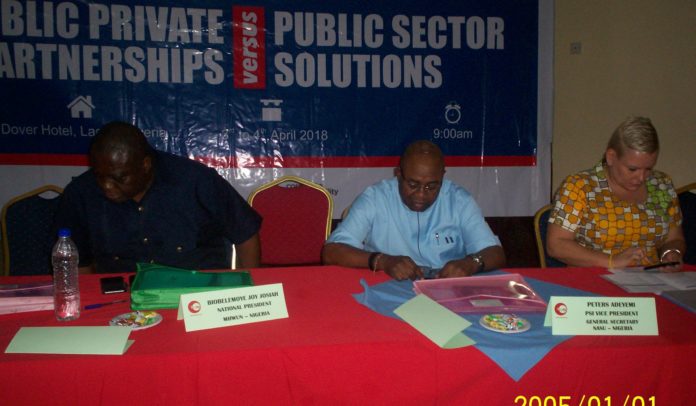By Daniel Kanu
Nigerians have been called upon to rise against water privatisation in Lagos State and other states in Nigeria.
Civil rights groups and labour leaders worldwide,while condemning the proposed plan of the Lagos State government, said water privatization in the state would open the doors for privatization of water across the African region.
They also said that privatisation of water would further impoverish the masses and has not succeeded anywhere in the world.
The groups, which also proffered alternative to privatisation at a workshop in Lagos titled, “Public Private Partnerships versus Public Sector Solutions,” include: Public Services International (PSI); Environmental Rights Action/Friends of the Earth Nigeria (ERA/FoEN); Amalgamated Union of Public Corporations Civil Service Technical and Recreational Services Employees (AUPCTRE); Corporate Accountability; Peace and Development Project (PEDEP); Centre for Children’s Health Education, Orientation and Protection (CEE-Hope); and Center for Dignity.
Others are African Women Water Sanitation and Hygiene Network (AWWASHNET); Child Health Organisation; Labour, Health and Human Rights Development Center; Centre for Energy and Environmental Sustainability; Earthcare Foundation; Women Advancement Center; and Journalists Initiative for Sustainable Environment (JISE).
The National President, AUPCTRE, Comrade Benjamin Anthony, lamented that many African countries were planning to privatize in the erroneous belief that the public sector was ineffective and inefficient.
He accused the International Monetary Fund (IMF) and International Finance Corporation (IFC) of propagating privatisation policy in contradiction with rational thinking, good governance and ethics – as well as a large body of evidence-based research that indicates that PPPs are more expensive, and provide reduced access and quality of services.
Also, PSI General-Secretary, Rosa Pavanelli, who was represented by PSI Head of Campaigns, Sandra Vermuyten, presented PSI’s Campaign Against Privatisation of Public Services, 2030 Agenda and Current Global Policy Issues.
However, participants also pointed out that:
. There is a disturbing privatization tsunami sweeping across Africa;
. IFI’s and corporate power are behind the aggressive promoting of privatization as an alleged panacea to mismanagement in the public sector in Africa;
. Twenty years of World Bank promotion of PPPs and other models of privatisation have not yielded the much-touted success but instead left African countries with huge debts, infrastructural depletion and outright abdication of governmental responsibilities in terms of providing public services for their citizens;
. Land grabs by multinational corporations across Africa, including freshwater sources represents a new attack on common natural resources;
. Corruption contributes to granting of tax holidays, use of tax havens, and the creation of bogus projects that open gateways for more corruption;
. Synergy among labour unions, civil society, and other key players have lost tract considerably with dire consequences on people’s welfare;
. The majority of citizens have no knowledge of their rights and therefore fail to demand their implementation and enforcement, including unfettered access to safe and clean drinking water;
.Women, vulnerable groups and students are particularly at the receiving end of the lack of access to water and other basic needs that make life meaningful;
.Position of governments across Africa that assert that PPPs are a means of providing services to the people without tasking government finances is erroneous. In most cases the huge funding for PPP projects comes from government and little or nothing comes from the private sector;
. In fashioning solutions to public sector challenges governments across the continent have ignored critical voices of women, the youth and other critical voices in the society.
It was therefore agreed that:
1.African governments should reject privatization and anti-people models of intervention in the water and other sectors marketed by the World Bank and corporate powers under the privatization umbrella. Privatisation under any guise, including PPPs, is not the solution to the poor performance of the public sector.
2.Civil society, labour unions, students and grassroots groups need to build strong synergies and work together to halt the advance of privatization sweeping across the African continent.
3.There is a need to link the governance issues at the domestic front and across Africa with the global campaigns against privatization and for tax justice.
4.Remunicipalisation is a global trend that offers opportunities to build local democratic governance of infrastructure and water resources.
5.Involvement of civil society, faith-based organisations and people at the grassroots level, particularly Community Development Associations (CDAs) in awareness campaigns and actions to stop privatization in all forms. Communities must assert their ‘citizenship’ rather than accept ‘consumership’ through privatisation.
6.The Freedom of Information Act (FOIA) be explored and used as a tool to demand information on existing PPP projects
7.Probe of all funding for PPP projects across Africa, particularly in the water, energy, health and other sectors
8.Commencement of educating people at the grassroots on the dangers of PPP via mobile outreach
9.Involvement of the media in promotion of success stories in the fight against PPP in the water and other sectors across Africa to boost the morale of agitators for change. Also, promotion of further research in other countries on the African continent on the performance of PPPs as has been documented in Ghana, Kenya, Rwanda, Uganda and elsewhere.
- Creating a platform in tertiary institutions to educate students and involve them in the struggle against privatization of water and other sectors of the economy
- Winning the campaign against water privatization in Lagos will send an unmistakable signal to the World Bank, corporate powers and other promoters of privatization
- Contribute to PSI’s platform on PPPs-privatization –people over prof.













